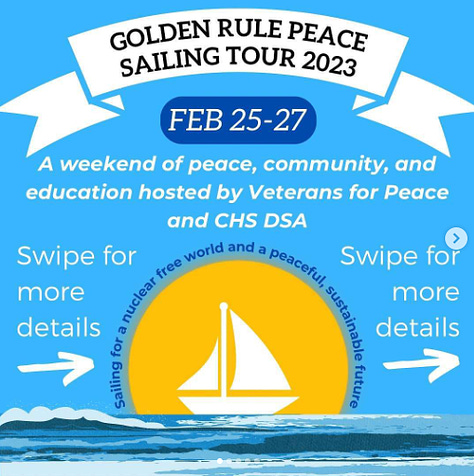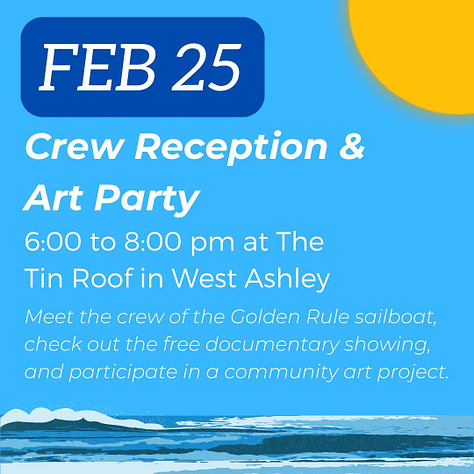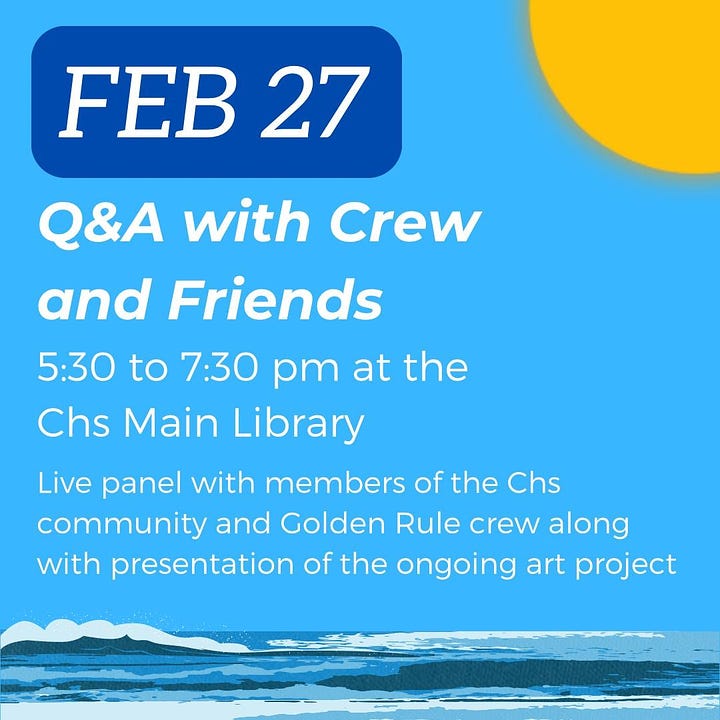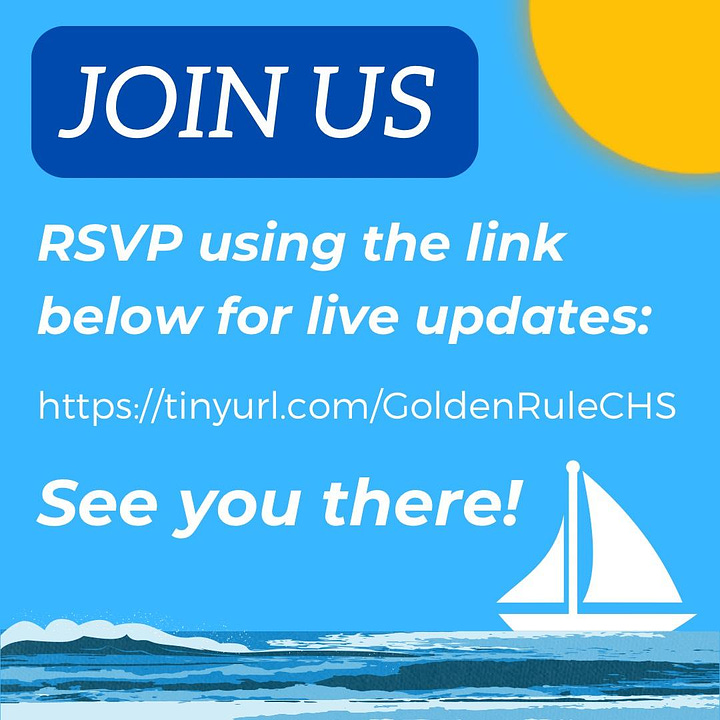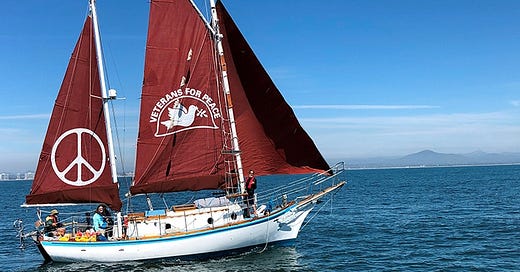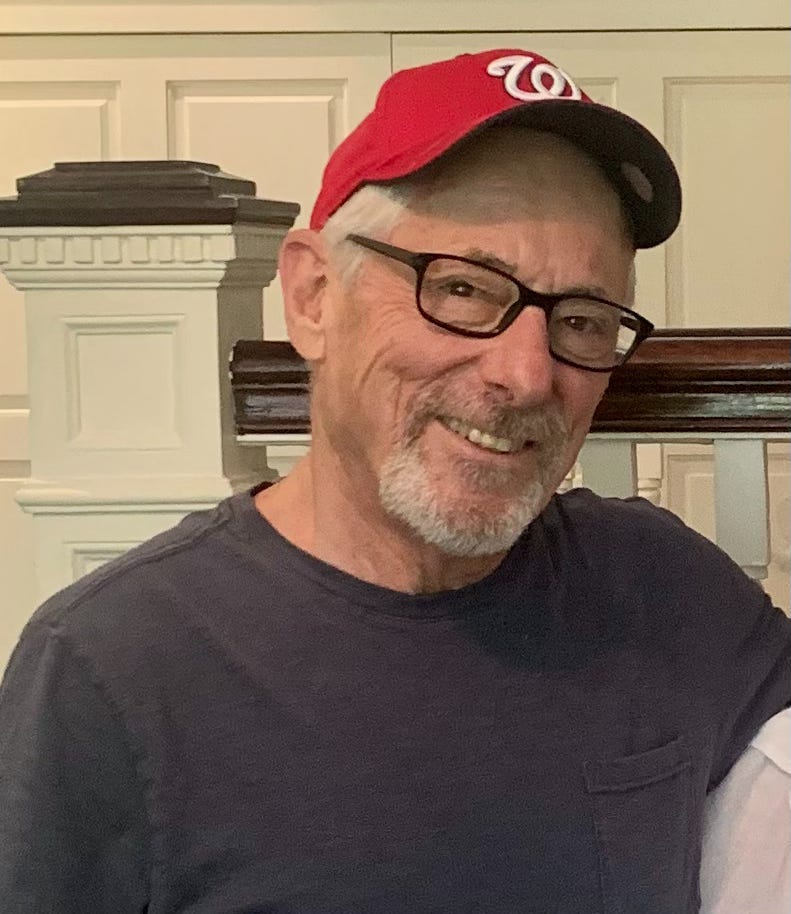Setting sail against nuclear doom
Q&A with a Veterans for Peace activist as the Golden Rule sailboat approaches Charleston
Saturday morning, a historic anti-war vessel will dock in Charleston for several days of anti-war and anti-nuclear weapon events. Today I wanted to share a conversation I had with my friend Harvey Bennett, the Veterans for Peace organizer who led the effort to bring the Golden Rule ship to the Holy City.
Originally sailed by Quaker activists who opposed nuclear testing on the Marshall Islands, this sailboat has been lovingly restored and has been on an epic voyage down the Mississippi River and across the Gulf of Mexico. It is currently headed up the East Coast from its most recent stop in Savannah, Georgia. Check out the Golden Rule Project website to see if the ship is stopping in your city.
Here in Charleston, my friends with VFP and Charleston Democratic Socialists of America have a full 3 days of events planned, including a meet-and-greet with the crew, documentary film screening, and a peace picnic with Food Not Bombs. Click here for event details.
Brutal South: I was wondering if you could tell me about your time in the military — what branch, where you served, and how you became a peace activist coming out of that?
Harvey Bennett: I went to college on the Navy ROTC scholarship. I went to Georgia Tech. So when I got out, I owed them 4 years. My first 2 years were spent on the on the USS Tattnall, which was a guided missile destroyer, DDG-19. That was in 1965, and it was home ported in Charleston, so I was actually in Charleston even though I didn’t get to know it very well because we spent a lot of time in the Mediterranean.
And then my last 2 years I spent on an aircraft carrier out of Alameda, California, and we spent most of our time bombing Vietnam, Laos, and Cambodia. I was not part of the air wing, I was in the engineering department, but that experience did impact me quite a bit. I just found it morally compromising to be part of it. It was just so outrageous, you know.
So when I got out of the Navy, it was November of ‘69, and I got out in San Francisco and I headed straight for the first anti-war demonstration I could find. I’d actually been to a lot of them when I was still in the Navy, so I was very sympathetic to it, and I think I always was suspicious about wars, pretty much. I was pretty attracted to the folk music, and a lot of that was very socially progressive and anti-war.
When I was in the Navy ROTC, this was one of those rare hiatuses when we were not at war, so the peacetime Navy or military is different. But by the time I got out Vietnam was heating up, so it was very possible I’d end up being drafted if I had not done what I had done. I was very lucky not to be in harm’s way out on that aircraft carrier.
The ship that’s coming to our port, the Golden Rule, its history dates back to before your time in the military.
Right, 1958.
And it’s been restored, and now it’s making this trip, and I’m wondering, what do you hope comes out of bringing this ship to Charleston?
Well, I hope for some press coverage, which I still don’t know if we’re going to get, but I wanted there to be enough going on to where people would hear about it and it would just make people aware that there are people out there who really believe that we have to choose a path of peace. These wars just don’t help anyone. So this is just a powerful symbolic kind of visual thing that can help deliver that message, and the story is pretty inspiring. We have a documentary, and I don’t know if you’ve seen that, but if you go to the website (vfpgoldenruleproject.org) you can watch the documentary.
We do have some local people too, and we’re going to have some local speakers, which should be good to make the connection between militarism and the way it impacts the people of Charleston.
I’m sure this is true in a lot of towns and states on the tour, but South Carolina has several military installations and historically we’ve built a pretty good piece of our economy around war industries. Do you get much pushback when you talk about peace activism or about pushing back against nuclear proliferation?
Well, since I’ve been in Charleston, I haven’t had that many opportunities to do that. We have a tai chi class and I’ve passed out flyers, and I’ve been pleased that the responses have been pretty positive.
It’s really significant that they’re coming here because Charleston has such a strong symbolic meaning to our whole history of white supremacy and slavery, and the Civil War started here. I think for a sailboat named the Golden Rule to come to a city that was built on all this wealth on a system that prohibited the practice of the Golden Rule — you know, I think that’s pretty powerful.

The ship is still named the Golden Rule, and I understand the people who originally sailed it were Quakers. Is this still at its core a spiritual or religious project, or has it become more broadly secular?
I don’t know that I’d call it religious, but it is a project that is based on fundamental moral values that every religion incorporates. For me it’s a spiritual thing for sure, and it also has some really urgent practical application.
When they started this in 2013 and renovated, there was no treaty on the prohibition of nuclear weapons, which has now actually entered into force as of 2021. And people don’t know about it because the media ignore it studiously.
Actually I don’t know about this. What was it that went into force in 2021?
The UN Treaty on the Prohibition of Nuclear Weapons. So, it went into force after 50 countries had ratified it, and that was two days after Biden’s inauguration. Now 68 countries have ratified it, and there are another 20-something that are in the process of ratification. But of course none of the nuclear powers have signed it. The U.S. has done everything they can to harass and intimidate anyone that even considers participating. None of the NATO countries have signed or ratified it. Ireland has, Austria has, but mostly it’s the global south.
It’s a powerful treaty. It prohibits the possession, the research on, the deployment, the transfer — I mean, anything having to do with nuclear weapons. And none of these countries can participate in activity that aids that, through a lot of things like banking institutions, research centers, educational programs. So if enough countries get on board, it’s going to make it pretty hard for these countries to maintain an arsenal.
You know, the thing is, when they have done polling of all these countries, all the NATO countries that have been polled, right around three-fourths of people are in favor of it, but the political establishment has managed to ignore it. It’s going to take a mobilized populace that makes a lot of noise and moves the needle.
And that can happen. I mean what really triggered it was Ronald Reagan’s presidency, because he called the Soviet Union an evil empire and decided they were going to try to keep up with us in a nuclear arms race and destroy their economy, and in some ways it succeeded. But it also awakened people to the dangers of that, and there was a huge popular outrage about that. In the early 1980s there were 63,000 nuclear warheads, and now there are 13,000. So you can make a difference. But 13,000 is still more than enough to destroy all humanity on the planet.
***
Details for the Charleston tour stop can be found on the event page or on Facebook. To learn more about the Golden Rule Project, visit vfpgoldenruleproject.org.
I serve as volunteer communications secretary for Charleston DSA, where our focus for 2023 is on housing justice in the greater Charleston area. Harvey is also a member. If you’d like to learn more, our website is charlestondsa.org and the link to join is dsausa.org/get-involved.
If you’re local and would like to spread the word, here are some graphics you can share on social media:
